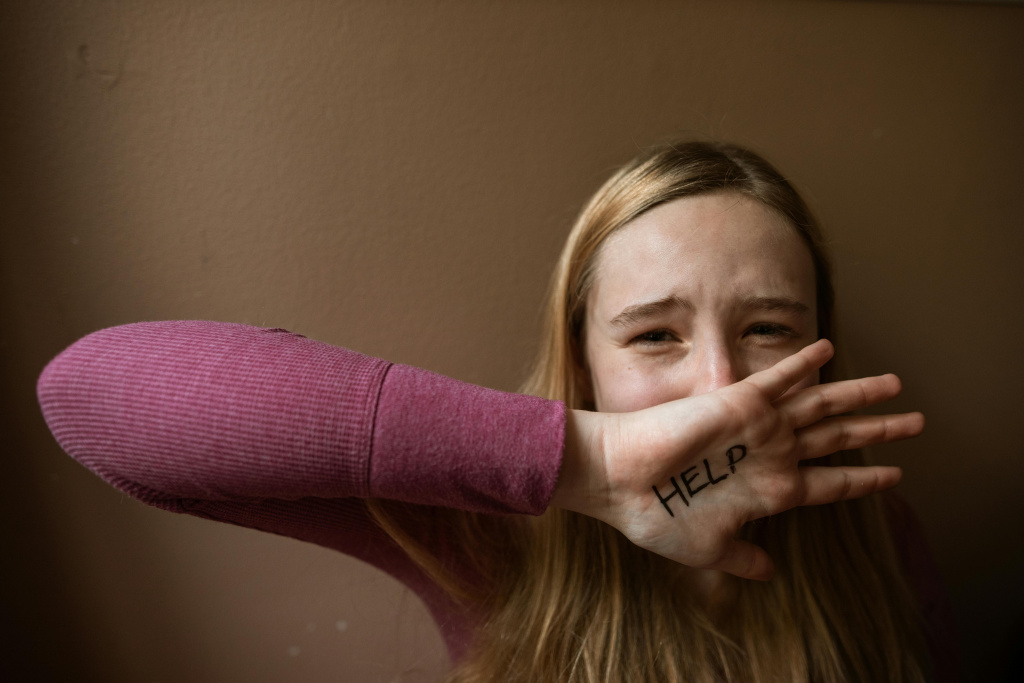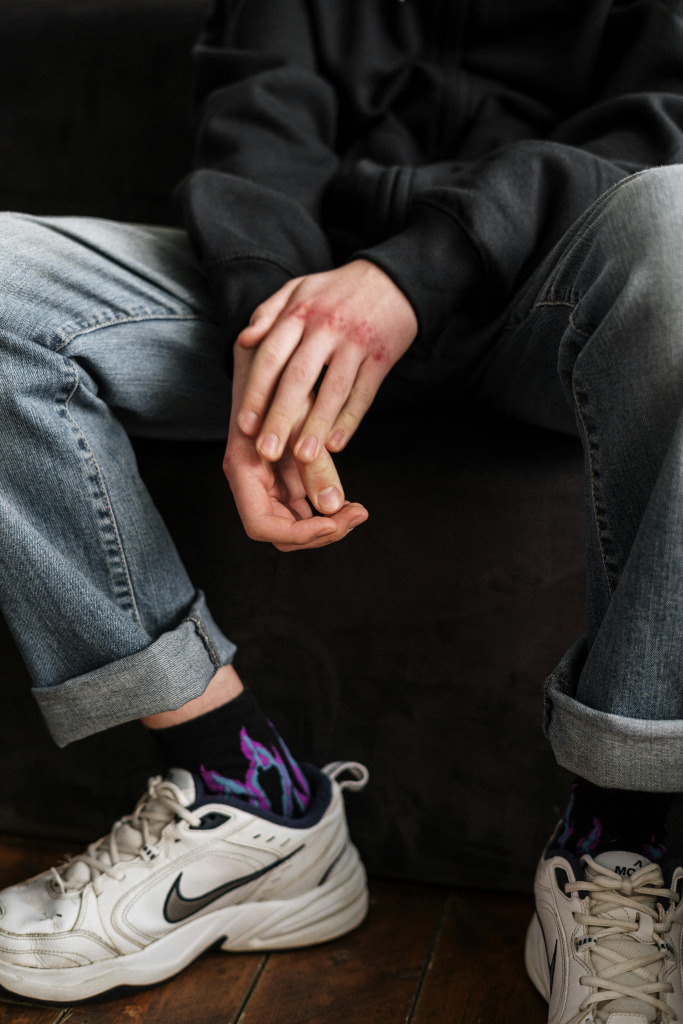• In this chapter, I address disruptive development because of trauma.
How to approach someone who is hurting.
How victims harm themselves.
Dysfunctional families and scapegoating.
1. Introduction 2. The World Is A Battlefield 3. The Church: A Feast for Oppressors? 4. How Did We Become Victims? 5. How do victims communicate? 6. Being a victim of an offense and victimhood 7. Learned Helplessness 8. Victim-blaming 9. God’s solution to sin 10. How Satan uses the Bible to force us to submit to him 11. The Good Shepherd 12. Victimhood as a weapon 13. The Victorious Christian 14. Practical exercise towards freedom. 15. Restore your trust in God. 16. Why God allows difficulties. 17. Church Tribulations 18. Final Victory 19. Afterword
Often, sexual abuse is the most recognized childhood trauma. In this book, the mental health issues addressed are not just those of victims of sexual abuse or incest. Even so, it is worth noting the extreme number of people who have suffered different sexually motivated assaults.
Childhood trauma and mental handicaps are caused by many situations. A violent household, poverty, and stress, broken families, immature parents, overprotective parents, narcissistic parents dividing children into roles, favoritism, emotionally unavailable parents, abandonment by a caregiver, bullying at school or at home, siblings harming other siblings, neglect, drugs, alcohol, war, and disease. It is usually the combination of several problems piling up that breaks someone down. It can be one big event, or it can be many minor issues that together have caused great harm. Often, we try to find the reason for the harm in a single event or event to have something specific to point to, but the overall stressful daily situation that many cannot explain properly can cause the same amount of damage. Therefore, the mental damage someone suffers is the evidence, even if there appears not to be a specific, great, visible event to point to. Often, shame causes people to mention the smaller issues, and they hide the big issues behind them. Many test the waters, so to speak, to see if someone can be trusted with more serious matters. This testing is common with people who have suffered narcissistic abuse and have systematically experienced how sensitive information is either used against them or used to change the narrative. Many are scared to open up because of past abuse. Another reason is that often when the abused expresses need or hurt, they get the worst response from their abuser, and so this has taught them to fear expressing hurt, being open, or asking for help. In such cases, it takes time and a lot of work before the full story is told. If they are dismissed early on because what they said they experienced did not seem like a big deal compared to others, then the people who are afraid to open up will never get the help they need. This is why it is so important to show care to people, not based on what you know about them but based on the need you see. The important thing is not to compare or measure one who struggles with another. If they struggle, they struggle. Help is needed even if we do not understand why they have issues or if we do not understand our own issues. If the leaves are blowing, there is a wind, even if we can’t see it. If there is smoke, we know there has been or is a fire.
If we are clearly struggling, there is a reason, even if it’s not understood. No child or teenager holds a degree in psychology or can understand damaging behavior to its full extent. They adjust to their surroundings and think the toxic behavior they experience daily is how things are supposed to be. It can take many years before they understand they have been harmed for life. Children and teenagers will, without understanding, act out their anger, anxiety, and frustration when something is wrong. Asking them what the problem is can sometimes be like asking them to have deep psychological insight, which they don’t have. You will not get them to open up. Asking them if they need help or if you can be of help can also fail because they do not know what help they need, so they cannot tell you because they don’t understand themselves. Thus, they will not receive help because the wrong questions were asked. Then they are given up because “you tried” but the child or teen made it impossible by not “cooperating”. Even many adults do not understand how you can help them or where the issue really lies.

Most abusers or abusive people do what is popularly called “gaslighting.”. Their victims will feel and have the effects of abuse, but they are also brainwashed into thinking nothing is wrong with their abuser or the situation. They are coached to think that somehow they are struggling because there is “something wrong with them personally” and with their response to abuse rather than the abuse itself.
Someone who gaslights will often harm and then say to their victim, “What is wrong with you?” and “You need help!”.
The waiting room at psychologist’s offices is full of people told they are the problem and “need help,” while the real problem is sitting at home eating snacks and feeling good about themselves. A victim first needs help to understand what is harming them, to be free from its harmful influence, and then assistance to heal and reconstruct their lives.
The point is that no matter how or why, we cannot imagine away our own or others’ damage because it suits us. It must be addressed. If there is damage, if there is a disturbance, or if there is a mental health issue, there is a reason behind it. And we do not need to know someone’s reason to help them or to have compassion. The damage we see should be enough to induce compassion. People are not self-destructive without a reason. In the biblical story of the merciful Samaritan, we see someone who did not stop to figure out if the man lying on the side of the road was guilty of his calamity before helping or if he perhaps deserved his assault. Rather, the Samaritan saw an immediate need and acted to fulfill it. (Luke 10:25-37)
Many victims take decades to understand what went wrong, even to remember what they have suppressed, and because they were not taken seriously based on their early behavioral response to the harm, they lose years of their lives struggling with mental health problems that could have been solved early on. If someone is hanging from a cliff, they need to be pulled up from it, regardless of whether they tried to jump, tripped and fell, or were pushed. Those who are self-destructive and struggling need help, regardless of how or why they are struggling. Many who have been victims of incest are not open about it until they have had children and are adults. But the damage would have been noticeable many years before that. This is why it is important to offer help based on behavior and not just publicly known history.
In short, it is important not to ignore symptoms of harm. The symptoms are almost always self-destructive behaviors. Self-destructive behavior and self-sabotage are signs that there “is a fire somewhere,” even if they do not speak up about it. Speaking up and opening up can be one of the hardest things for a victim to do because they are confused and scared. Many are coached or threatened into silence. Some have learned that speaking up only makes things worse. As mentioned, there can be trauma behind choosing silence. No one should demand that someone tell their secrets for you to be willing to help. If you see someone struggling, being there for them and earning their trust is essential to helping them. Don’t expect someone to open up to you right away. Do what you can to make their world a better place without expecting anything in return. Be an example of goodness, so they can, from your kindness, learn to distinguish and understand what they have experienced as wrong. The victims are not the same. Other victims open up and talk over and over again about what has happened to them. This is also part of the healing process, allowing for repetition until they feel they are truly heard and seen. It can also be a symptom of constantly questioning their emotions and perceptions and, therefore, needing to talk and hear again that what happened was wrong. This is because some were manipulated to question their perception and even trained to question it by the abusive person. This confusion can last a lifetime. Whenever the memory comes up, a victim might still go back and forth between the abuser’s narrative about them and what happened and their own. So often, they need repetitive reassurance, almost like a training exercise, to stay healthy. Words like “Yes, you already said this, and now you have to move on” can be retraumatizing for a victim. Make sure you are ready to hear the same story several times. If you are the victim, be prepared to go down the same road several times; don’t blame yourself for it. If the abuse was repetitive over time, the healing from it might also require repetitive exercise over time.
There is also another aspect to the retelling of trauma. The first time someone tells their story, it might not be the full story because they fear how it will be received. And so, each time they tell their story, a new detail might be shared. Some details might even be removed, especially those they have added to seek affirmation or adjusted based on how they fear their story will be received. Many who have been abused and gaslighted have learned to lie to escape being emotionally or physically violated. Their lies might not be malice; they are self-defense. It was how they survived. Be aware of this. If they are scared, their stories might not be told accurately at first. It is not unusual for victims to lie; unfortunately and naturally so, it causes them to be rejected when they do tell the truth. Every so often, the truth is scarier than a lie. Coached to lie to save their abuser, they might later be trapped by this web of lies when they finally open up. Another reason some victims lie at first is that abuse in their home is so normalized and difficult to express and explain that they feel they will not get help unless they say something concrete and accepted as wrong in their greater society. Toxic homes create toxic victims. Families that scapegoat can create victims that scapegoat. This does not make it right in any way, but if the goal is to help someone destructive heal, we have to consider that sometimes the victim is toxic or does not act as we wish them to. In such cases, when the victim lies and scapegoats, they need help to address the real issue. Attacking them for their lies first can make it hard to get them to open up about what is really going on. A good way to help is to ignore the possible lies (if not criminal or directly harming others) and give them space to open up about more in-depth issues. As they now open up and receive help for the real problem, when they are heard and seen for the real issue, they will let go of the need for the lie.
If you understand why they lie, it might be easier to forgive them and continue helping. So, allow and tolerate repetition if someone is ready to open up. Expect there to be both underplaying or exaggerations, scapegoating, and any toxic ways to get attention. No case or situation is the same. No one’s story or circumstance is the same.
The more troubles some have been through, the greater the stress and the greater the harm and aftereffects. What most childhood trauma has in common is an unsafe environment for the child, and this results in the child having to deal with these issues and surviving them rather than having a healthy, normal development. During childhood, the brain is in constant development. Long-term stress disrupts this development as the stress hormone cortisol is elevated, and if elevated over time, it can physically harm the brain’s growth and hormonal balance. This creates a mental handicap and delay; sometimes it is irreversible, yet it does not show on the child’s outer body. The child appears damaged, but it is not visibly damaged. And so, the child is often blamed rather than helped, which causes more stress and more damage to them.
Modern society demands that everyone be given the same education; they must take the same tests and receive the same physical training. They are all treated equally, and society demands the same of all, and the students’ accomplishments are measured by comparing them to each other and to a standard created.
This seems fair outwardly. While some who have a medical diagnosis might get extra help, those who are struggling with a toxic family situation do not. Initially, the harm from abuse is not seen or recognized, and so victims do not get any help or favor. The majority of the time, a child will protect their abusers and keep quiet, and so they will rarely get help in time to develop healthy. An emotionally damaged child will often be given additional stress, as they don’t have the same ability to deal with the standards that were created for healthy children’s development. What is fun and challenging for one child becomes stressful for another. All this pressure on the brain from home and society forces an automatic bodily reaction that is not activated in other children. This bodily reaction is both a defense mechanism and a coping mechanism. These coping mechanisms lower the high level of stress in the child by elevating hormones that reduce the stress. The body’s natural coping hormones to relieve stress are oxytocin, dopamine, serotonin, and adrenaline.
children
The stressed child’s body will start to crave these hormones, and many will seek to do and act in a way that gives them these hormones in an addictive way. If this is not obtained, the brain’s coping mechanism might result in dissociative states instead. We take it for granted that when we fall and hurt our knees, the body heals the wound, and before we know it, we will be fine again. If we keep falling and hurting the same knee over and over, a weakness is created, and permanent scars are more easily obtained. We can only take so much before the body gives in. Just like the body works to heal our physical wounds, the body also has an inner defense mechanism to regulate and respond to emotional threats. However, our bodies were not created to handle chronic stress and threats, and thus weaknesses arise from it.
Let us look at one example of how the body is confused by trauma.
The “fight and flight” response helps us escape or handle an immediate threat, and it does not damage us. The body is designed smartly. When in a threatening situation, the cortisol released pauses regular bodily functions and slows our metabolism, so a person will have extra strength to handle the situation. It is brilliant. When the body is constantly stuck in stress mode, it starts fighting itself at our expense. It chooses the biggest threat and fights it. One of the body’s biggest threats is stress, which causes various types of damage to our body.
This is why it is so common for children who suffer long-term emotional and physical threats to develop obesity problems either as teens or adults. Stress makes them crave dopamine, and food is an easily accessible way to get dopamine. This means they don’t just eat for nutrition; they eat for hormones to reduce their stress. At the same time, the stress hormones sabotage the metabolism and produce glucose, which again increases blood sugar levels. Thus, the body refuses to burn the stored fat and demands new food for energy instead. The dopamine is obtained, and the immediate stress is reduced, but the fat is stored and layered.
A child who is constantly stressed might then struggle with being overweight in their teens or adulthood as a result. To diet, they must force the body to burn the stored fat with a reduced-sugar diet —the very same foods that give dopamine. While trying this, the dopamine level reduces, the stress is elevated, and the body is demanding you do something to decrease it again. If the habit has been to eat the stress down, the body will crave food as the solution. Thus, the remedy is the problem, and the problem is the remedy. Most people have no idea what is going on with their bodies inside and do what the body urges them to do, and they get stuck in a damaging spiral with the diseases that follow. One of which, in this example, is diabetes and heart problems.
Let us explore this example further. Some will suggest training as a way to get hormones to relieve stress. However, for some, training will cause an elevation of stress hormones, and it makes them feel sicker without being able to explain why. They go to the doctor, and the doctor tells them they are fine, but they do not feel fine. Endurance training, where you exercise for multiple hours consecutively, can raise someone’s cortisol for several days. If it is already high and the body desperately tries to get you to lower it, it will shut down. The right training is therefore essential. The lack of understanding of how trauma affects people can lead some to give advice that can even harm or worsen someone’s situation. The same advice cannot always be given to the same people. Neither are people equally fit to do the same things.
Stress has a powerful impact on our bodies. It can even increase oxygen levels in the blood and the body. This is why many feel short of breath when they are stressed or anxious. When someone grieves hard, they can start coughing. Even someone guilty of lying in an interrogation room will feel dryness in their mouth and cough because of the stress.
Let us say a child has just experienced a form of abuse in the home and goes to school and gym class. They might perform poorly. Many children who are stressed are bad at gym class for these reasons. Another example is an adult living under great stress who tries to exercise but gives up because they struggles with what appears to be a bad condition. It is easy to assume the girl coming to Zumba class breathing heavily has “let herself go”. Some people who are living under chronic stress are exhausted from the moment they get out of bed. It is so easy to blame the person who struggles and give them”good advice” fit for normal life situations, but few understand the story that lies behind how people appear. This is just one issue a trauma survivor can have, and the problems and prejudice they face from people giving seemingly constructive advice. Binge-eating food is not everyone’s coping mechanism, but other coping mechanisms can have their own related problems. Like anorexia, finding satisfaction in denying yourself food instead. Some male teens seek dopamine and adrenaline from hard metal music, porn, and violent games. It is bad for them, but if they do not get help for what is causing the stress that makes them seek these stress-relievers, they cannot be helped to make better choices. Yelling at their stress relievers causes more guilt, shame, and stress, which pushes them further “down the rabbit hole”. What you try to steer them away from will cause them to do it even more. That is why, when helping someone who is self-destructive, requires us to have the ability to not just judge and scratch the surface but to look behind it to find the real cause that is destroying this person Christ died for.
Christ seems to dislike judging others without knowledge or understanding. He said: “Do not judge others, and you will not be judged” (Matt.7:1) Many have thought these words to mean we cannot judge when someone sins against another or against us. Rather, it might actually be judging others for handling things differently than us. We have a great desire to believe everything we are successful at makes us better than others, and so we blame those who do not achieve what we do. Unfortunately, those who struggle with mental health also struggle with physical health, and they are taught to blame themselves. In a way, we are all responsible for our health, but the right education and assistance are needed for someone to understand how they are handling their situation destructively.
Another known stress reaction is problems with memory, concentration, and focus. A child who comes to school to take a test after he saw his mother lying on the floor drunk in the kitchen once again, and left the child to help his siblings go to school, can be just as intelligent as the next kid. But once he starts to take the test, the stress interrupts his memory and concentration, and he does not do well. Over time, naturally, this kid will struggle with his grades, which lowers his chances of going to a good school. Again, this is an example of how long-term stress reduces someone’s opportunity to do as well as others. Many who have suffered trauma have to fight harder than the next person to achieve the same results, even with a reduced mental and physical physique. Some make it; others give up.
We see trauma responses manifested in all parts of our daily lives all the time. A man becomes very emotional because someone cut the line at the grocery store. Others might get annoyed, but this one man has a tantrum. People get scared, and others mock his lack of self-control. Today, these people are filmed and mocked online by millions. Some of them committed suicide, as it was the last straw for them.
Many adults have reduced emotional capacity and have an emotional response like a child. A myriad of different mental disorders follow trauma. Anxiety, paranoia, and depression. Our bodies were not created for a world of sin. Just like a fall off a building may leave you paralyzed for the rest of your life, trauma does irreversible damage too. The brain is affected by different psychological traumas, stress, and abuse. Research has shown that children suffering long-term trauma experience disturbances in their brain development that lead to emotional problems later on. It can affect cognitive abilities such as learning and processing new information. Problems with memory, emotional regulation, and behavioral control. This is not something you can tell a child or an adult to “snap out of”. Those who easily “snap out of it” get narcissistic and psychopathic traits instead. Our bodies are not fooled; they will strike back at any unnatural way of dealing with sin and harm.
The damage to the brain of someone who has suffered long-term trauma as a child can even be seen on brain scans, but people who walk past these same people on the street cannot see it. Everything we do —our emotions, memory, and perception, is dependent on our brain functioning well. Some people who have suffered brain damage are more likely to have an emotional, childlike response to certain situations. They are not bad people, but they can be easily perceived as unstable. Most people can handle a child acting out their emotions, but they get scared when grownups act the same way. We expect more, unaware that many don’t have the same inner tools to handle emotions. They have a handicap that does not show. Brain development damage is just one aspect of long-term trauma.
«Looking within those areas, the researchers saw that in volunteers who had depression and also reported childhood trauma, the anterior hippocampus (part of the hippocampus that plays a role in making decisions during conflicts) and right amygdala (linked to fear and sadness) were smaller. There also seemed to be changes in an area called the basolateral amygdala, involved in responding to danger. Fewer brain cells may mean that those areas are less effective at processing conflict, fear and sadness» . (https://www.psychologytoday.com/us/blog/open-gently/202106/childhood-trauma-shows-in-brainscans)
Another situation is someone who self-harms by cutting themselves. This is another way for the body to relieve excessive stress. The release of endorphins lowers stress and immediate anxiety. It gives a false sense of control. Just like overeating to relieve stress, self-harm is addictive for the same reason. You give your body an easy fix by giving it the hormones it wants to reduce stress. Those who deprive the body of food are basically doing the same as those who eat too much or very unhealthily; both create addictions to lower their inner stress.
There are healthy ways to reduce stress, but society is structured in such a way that it elevates stress in those already stressed at a time in their lives when they have no knowledge or even the ability to seek a healthy way to deal with their issues. And so they reach out to whatever is closest to them and easily available as the remedy. For someone within a sports community, that could mean sports that have a healthier outcome for them. Depending on whether the stress is affecting their physical condition, many people in difficult life situations will have problems with sports. But there are those who are not affected as much physically, and they might find relief in sports activities that give them adrenaline. For others, a quick “remedy” is drugs and self-abuse.
Some become overly sexually active, another act that produces the stress-relieving hormone oxytocin. Porn can also activate this hormone.
Most addictions out of control activate stress-relieving hormones but harm and suppress us, which again causes stress and the need to reduce it, trapping someone in a never-ending cycle. Some people replace an unhealthy addiction with a healthy one, but they are still dependent on and slaves to it to cope.
Ironically, this means that someone addicted to working out might be driven by the same desire for the same hormones and mental results that someone who binge eats is. They are both acting to relieve inner stress and chasing after hormones to achieve it. Yet, the training alcoholics see themselves as in control while the other is out of control. However, if you take the training from the one using it as stress relief, they are just as in turmoil and anxiety as the one trying to diet. The difference is that one addiction has a healthier effect, whereas the other does not.
God sees how men judge each other while being guilty of the same things, only manifested differently.
The world we live in addresses the symptoms of stress, but God wants to deal with the cause of our stress. When the constant elevation of stress and stress-related hormones is at work during long-term trauma and abuse, it damages the body in more ways than just mental. It leads to elevated blood pressure and elevated glucose levels, which can lead to type 2 diabetes. Stress disrupts the immune system and the inflammatory response system. Stress is known to cause obesity, depression, infection, multiple sclerosis, and lupus. As a child, it will affect the nervous system, brain function, and other organs, as well as reduce important neural connections during the brain’s development. “Stress affects all systems of the body, including the musculoskeletal, respiratory, cardiovascular, endocrine, gastrointestinal, nervous, and reproductive systems.”Trauma is also tied to atrophy of the spleen, lymph nodes, telomere shortening, and increased stress hormones, which impair immunity and increase inflammation. Impaired immunity and inflammation increase risk for cancer, cardiovascular disease, diabetes, anxiety, depression, viral infections, autoimmune diseases, allergies, and asthma» (https://salud-america.org/4-ways-childhood-traumachanges-childs-brain-body/https://www.apa.org/topics/stress/body )
Often, the long-term effects of stress are seen later in life, and little importance is given to those struggling early on. Many trauma survivors come to their doctor’s office with complaints of shortness of breath, pain, or digestion problems, only to be told that they are fine and don’t fit into any of the standard categories. They are not seen, heard, or believed in and are instead humiliated. While the symptoms are real and not imaginary, they are also lethal in the long term. A doctor with respect for himself or herself should be concerned for anyone living with chronic stress and having strong symptoms from it, as with any other illness.
The Bible talks about sin destroying us and the world, and sin is why stress is constantly activated. Stress is destroying us; it is killing us. Sin and stress are related in the sense that sin is the action and stress is the response to the action. Sin is the choice; stress is the consequence. It does not have to be your sin that causes the stress, but all sin will cause stress somewhere and with someone. Even for those who do not admit their sin, their bodies will still have a stressful reaction to it.
The body is confused and feels threatened, but it does not understand the threat. God did not design our bodies for sin, yet we are now living in a world of sin as sinners. Thus, the body is constantly fighting for our survival. A lot of the time, we don’t understand who is at fault, why we are stressed, where the anxiety comes from, or why those responsible tell us they have done nothing wrong. The world’s “experts” might even tell us that our sin is healthy, and what God calls healthy is the sin causing the stress. They call good evil, and evil good. As stated in Isaiah: «Woe unto them that call evil good, and good evil; that put darkness for light, and light for darkness; that put bitter for sweet, and sweet for bitter!” (Isa.5:20)
Sin is not natural in God’s world. The body is confused and feels threatened, but it does not understand the threat. God did not design our bodies for sin, yet we are now living in a world of sin as sinners. Thus, the body is constantly fighting for our survival. A lot of the time, we don’t understand who is at fault, why we are stressed, where the anxiety comes from, or why those responsible tell us they have done nothing wrong. The world’s “experts” might even tell us that our sin is healthy, and what God calls healthy is the sin causing the stress. They call good evil, and evil good. As stated in Isaiah: «Woe unto them that call evil good, and good evil; that put darkness for light, and light for darkness; that put bitter for sweet, and sweet for bitter!” (Isa.5:20)
This is confusing because our body was initially designed to meet God’s standard. The confusion makes addressing the cause of our stress sometimes almost impossible, and many must invent or imagine the threat to find some peace in addressing it. It is a form of dissociative victimhood. To give the blame to the wrong people and situations. An example could be addressing sexual abuse or mental abuse in the home. As they have been taught that it is not wrong by the ones at fault, even when it is, the powerlessness can cause them to create a “scapegoat” or “villain” to cope and show anger towards the wrong person.
It can be compared to a recurring situation where people are so thirsty for justice that when a crime is committed the police would feel
rushed to pick someone to satisfy people’s wrath and “calm the storm”. It has led to countless innocents being wrongly convicted. In the USA, the foundation called the “Innocent Project” overworks by trying to free all the innocent incarcerated. It has also made way for what is today called cancel culture. When there is distress, society looks for someone to blame to create some kind of temporary relief, and one person is picked to take the blame for a greater societal issue.
The author, Luke Burgis explained it well, saying: “A scapegoat is someone or some group that is used to achieve a very specific purpose. People make scapegoats when there is some fundamental truth that they don’t want to acknowledge, so a person or a society can transfer the blame to them, expel or eliminate them, and imagine that the cause of all their problems is gone. People do it because it produces a sense of catharsis, relief, or healing. Scapegoating feels good because it is a way of protecting ourselves from having to suffer. Somebody else has to pay the price of our sins and our weaknesses. Scapegoating also forms group identity. Throughout history, when there is absolute social disorder, it is the time when there is most likely to be a scapegoat. And the scapegoat brings a moment of peace and relief” (The ugly psychology behind scapegoating | Luke Burgis, https://www.youtube.com/watch?v=cLa0zqShCcw )
In every dysfunctional family, the need to blame one family member happens. Even in a dysfunctional family, an order of dysfunction is created, creating an illusion of normality in the abnormality. The member of the family who addresses “the emperor has no clothes” and exposes the toxicity, usually because they are victims speaking out, disrupts the other family members’ facade and coping mechanisms. Thus, the one who speaks up and does not go along with the family group dynamic automatically becomes the “scapegoat,” is given the blame, and is told they are the disruptive and toxic ones.
As I will address in a later chapter, scapegoating is a term taken from the Bible and used in modern psychology in its own setting. However, scapegoating can be used in good and bad ways. If the blame is put where the fault is, the peace created is good. In a sinful world, this is disrupted, and the scapegoat is often the innocent or the one who wants to change a toxic situation. This is because man loves sin and continues to sin; thus, the good guy is considered to have a destructive element, and an illusion is created that everything that goes wrong or feels wrong is not because of sinful actions and choices but because of the one pointing them out. Depending on a group’s or individual’s motive and desire, the good guy or even the victim can be perceived as a bad and dangerous threat. This might also induce the victim to scapegoat someone innocent, as the guilty refuse to take the blame for their actions. Not understanding themselves, they are looking for someone to blame for how they feel, finding something or someone that stands out. This is how many deal with sin, they create an alternative suppressor or look or even provoke someone to suppress so that they can claim victimhood and get the sympathy they were denied for the real harm they experienced. A family that refuses to acknowledge their crimes towards their children and even portrays the child as a liar might induce the child to as a teen and adult seek victimhood somewhere else where they can receive the justice and sympathy deprived of them as children. And thus, a victim can easily claim to be a victim of something else. Many male serial killers have been found to punish other women for something another female has done to them in the past. This is also another way of dissociating the issue and diverting blame. Even a cold-blooded murderer cannot sometimes face their transgressor out of fear and attack someone who resembles them instead. This is an extreme example, but the principle behind it happens in ordinary families as well. If trapped in a situation or dependent upon someone abusive they are scared to address, it is easy to take it out on a stranger in the local store who said something that triggered them instead.
For example, someone might suffer degrading treatment at home without retaliating, but when a stranger, in a brief moment, makes a comment that can be interpreted as degrading, the person has an overreaction and snaps and yells at that stranger. Life is full of people walking around as “undetonated bombs,” and usually innocents are made to pay.
Many find satisfaction in making themselves the threat and then punishing themselves to feel “relief”. They become both abusers and victims, taking control of both roles to “silence” the need for justice. Some people’s stress causes apathy, the body becomes depressed and shuts down meaning and purpose so that you will be less stressed and emotional about what happens. Usually, if you tell yourself the situation you are in is impossible and that there is no solution, you perhaps unintentionally cause your body to go into a depressed mode to help you cope. Our bodies do what we tell them to, even if we don’t mean for them to respond in that way. The human hurt is so complex and has so many sides and pits. But although the consequence of sin manifests in thousands of ways, it all has the same beginning.
Science has not even begun to see or understand half of how sin causes harm. Refusing to acknowledge God’s definition of sin they are not able to stop the consequences of sin and the hurt. The more a society deviates from God’s standard the more pain and suffering will ensue, because sin causes stress and dissociation whether they believe in God and His standard or not. God’s science is real science, while those who choose to justify sin have the science of wishful thinking and society remains the same or worsens.
All the problems we face in the world today are the result of mankind battling their hormones, their hurt, deviating blame, their addictions, and so on.
God knows how our bodies work, and how we got into our mess. He understands how we choose destructive ways to combat evil with evil sometimes unknowingly and unwillingly. He has the solution and the way out of the cycle of pain and defense. We just have to listen to Him and stop thinking we know what is best for ourselves. «There is a way that appears to be right, but in the end, it leads to death» (Pro.14:12) For we are controlled by impulse and emotions when we make our decisions, God needs us to stop and listen to Him to find our freedom. Help us regulate and regain control over our stressed emotions.
God has good news; He has the remedy.
When Paul was scapegoating the followers of Christ, thinking it would solve the societal problems they had at the time, Jesus met him on the road and said: “Saul, Saul, why persecutest thou me? ..it is hard for thee to kick against the pricks” (Acts 9:4&5) Paul thought he restored order and peace to Jewish society by eliminating the followers of Christ, but he was mistaken. It was true that Christ’s followers were disruptive to the Jewish state, to families, and even to their way of thinking. Still, Jesus claimed targeting them would be hard for them long-term, as what they considered the problem was actually the solution, and the known order was problematic. Paul then joined the other side and was considered a disruption and a problem for the other Jews, who now wanted to kill him. Paul’s life did not become easier—far from it—but his soul was at peace. Christ let Paul know that persecuting or putting the blame wrongly would not make the problems go away, and he would eventually be hurt by diverting blame to the wrong group. The Jewish nation was a dysfunctional family that needed to be broken up before they harmed the truth and their people even more. Living in lies and diverting blame only brings temporary relief, but it rarely resolves the problem or brings the needed change.
Jesus tells everyone the same. He does not promise life will be easy, only that our wounded souls will find emotional rest in the truth and in living the truth. It does not help if anyone becomes powerful and can eliminate all their enemies if their insides are full of anxiety and despair. Jesus said, “Come to Me, all who are weary and heavy-laden, and I will give you rest. Take My yoke upon you and learn from Me, for I am gentle and humble in heart, and YOU WILL FIND REST FOR YOUR SOULS. For My yoke is easy and My burden is light.” (Matt.11:28-30)
«Wherefore do ye spend money for that which is not bread? and your labour for that which satisfieth not? hearken diligently unto me, and eat ye that which is good, and let your soul delight itself in fatness.Incline your ear, and come unto me: hear, and your soul shall live; and I will make an everlasting covenant with you, even the sure mercies of David. » (Isa 55:2/3)








